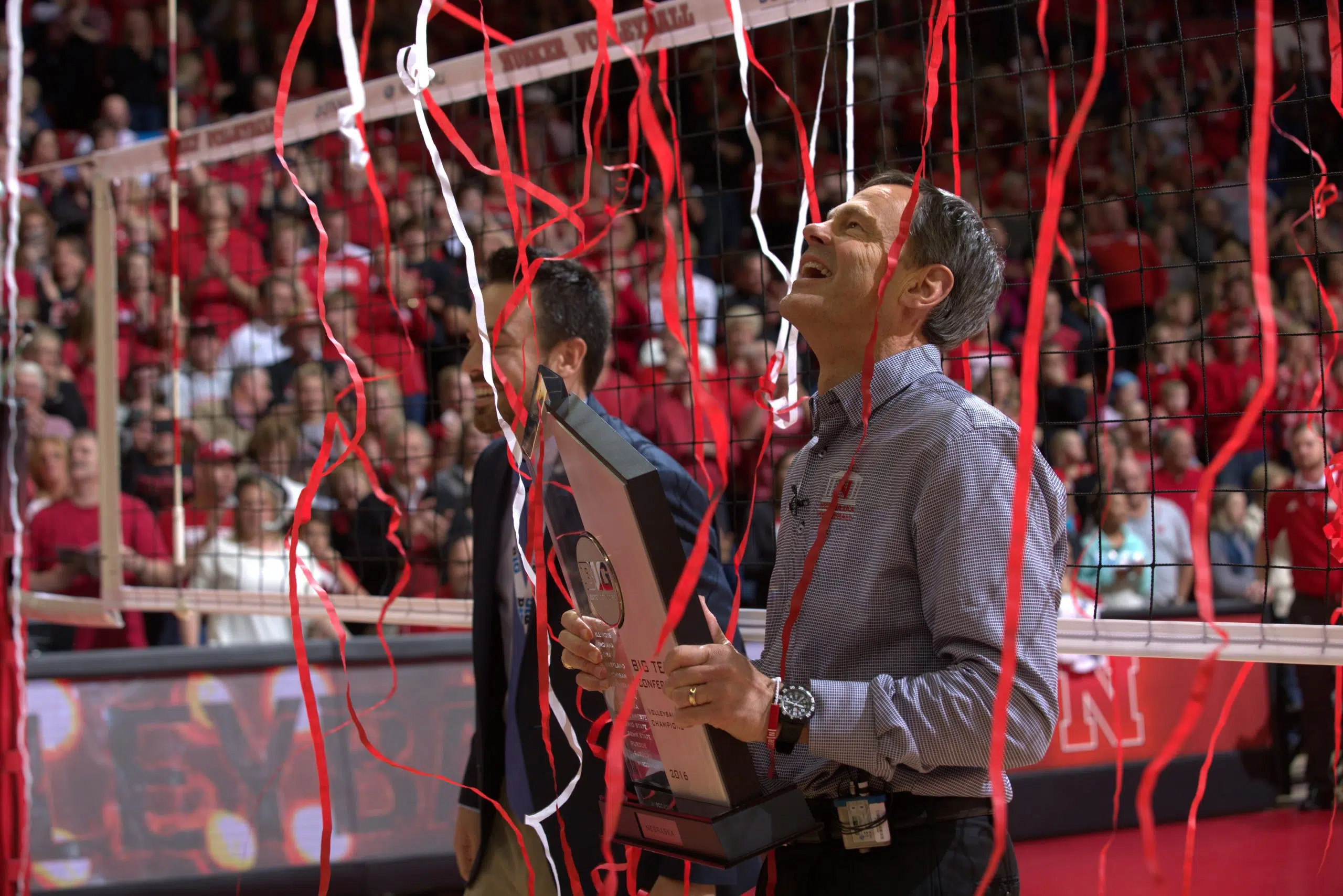Story by Leo Adam Biga, Flatwater Free Press
University of Nebraska volleyball coach John Cook entered the 2009 season having won 281 of his first 300 games – a ridiculous .937 winning percentage.
He had already won two national titles. At age 52, he had ascended to the pinnacle of his profession.
But, inside, Cook knew he didn’t feel like you are supposed to feel when you reach the summit.
Instead, even as his squad went 31-3 and reached the volleyball Final Four, John Cook felt empty. He felt lost. He felt like a failure.
“I thought I had it figured out and then it all came crashing down. I woke up one morning and the world was upside down…I was like, ‘There’s no more joy in this,’” said Cook.
For his entire career, Cook had been a fit, confident coach, husband and father.
Now he couldn’t sleep. He felt tired, anxious. His moods swung wildly.
He went to doctors. To specialists. To the Mayo Clinic. The white coats ran test after test on the living legend volleyball coach.
“After they ran all the tests they couldn’t find anything wrong,” Cook says today. “It basically came down to stress.”
“It’s one of those things where you hit bottom and you’ve got to make changes.”
What John Cook now understands is that hinging happiness on winning or perfection can make you sick.
Cognitive behavioral therapy and a host of other changes have helped Cook, now 66, learn this and much else about his mental health. Now he’s willing to talk about what he’s learned – to his teams, to volleyball fans who revere him, to anyone who may be helped by hearing his story.
“At first I was very skeptical,” he said about therapy and the other changes. “But it worked.”
After Cook hit his self-described “bottom” in 2009, he began to work with nationally-known cognitive behavioral therapy expert Debra Hope, a University of Nebraska-Lincoln psychology professor and now a University of Nebraska administrator.

Photo courtesy of the University of Nebraska Athletic Department
They met weekly until Cook started to emerge from the depths.
“A lot of it is breathing, being aware of the signals your body’s sending and coming up with strategies on how to deal with it as opposed to letting those sensations get to you,” Cook said. “It’s a very natural, holistic way to work on the mind and the body.”
Seeking help also meant being vulnerable with people Cook had long admired. He sought counsel from his mentor, Husker football legend and then-Big Red athletic director Tom Osborne.
“I asked Coach Osborne how he dealt with the stress of the job and he said, ‘John, I didn’t, I had a heart attack at 49,’” Cook said.
On Osborne’s recommendation, Cook started to meditate. He read a book the football legend recommended on stress, diet and the heart.
He started to pay attention to things he had rarely considered before – nutrition, sleep, recovery, breathing.
“The little things matter,” Cook said. “You can’t just run yourself into the ground.”
He has to pay close attention to the little things, Cook now knows, because the stress of Nebraska volleyball isn’t ever going to go away.
Last year, for example, Nebraska fell just short of the national title, falling to Wisconsin in the championship match. For almost any other program and any other coach in the country, that season would have been an unprecedented success.
For Nebraska: “We’re expected to win,” Cook said. “There’s a lot of pressure… People just assume we’re going to be in the Final Four every year.
“Well, it’s hard to get to the Final Four. We feel that. That’s where I’ve had to take my ego out of it and realize it’s about Nebraska volleyball, the team, maxing out and those student-athletes having a great experience.”
Now Cook has a game plan for the daily management of stress – a plan that doesn’t feel all that different then devising a strategy for a tough on-court opponent.
He does yoga. Cook found a good yoga teacher who taught him breathing and mindfulness.
The book “Where You Go, There You Are” by John Kabat-Zinn deeply resonated with Cook when he first read it. Now he uses it as a guidepost, referring back to it when he needs to.
He has improved his diet. He even gave up coffee.
“My nervous system was fried from the caffeine.”
This self-described “animal of routine” said he finds himself automatically meditating now in order to “calm my mind down.”
He sticks to a consistent exercise pattern. He tries to get consistent sleep.
“Those things all become more important in your life than whether you win or not,” he said.

Photo courtesy of the University of Nebraska Athletic Department
Anxiety issues don’t only affect coaches. Cook now recognizes that his players obsess over winning, losing, roster spots, classes, tests, dating and everything else 18- to 22-year-olds juggle.
To help, he enlisted Ron Hruska from the Postural Restoration Institute in Lincoln to work with NU’s in-house performance team. Hruska helps athletes with posture, nutrition, sleep and stress management.
Two psychiatrists and a retired Navy SEAL commander have helped the coaching staff understand this new generation of players – why their attention spans seem shorter, and what makes them tick.
A calm app on their iPhones now helps Nebraska volleyball players with meditation.
There were no phone apps when Cook went through his struggles. His meltdown coincided with the much publicized panic attack Urban Meyer suffered in 2009.
“He was burned out.”
Cook understands how it happens. The endless hours, the intense pressure, the do-or-die attitude to be elite are part of an unforgiving syndrome.
“That’s why you’ve got to meditate – you’ve got to let your mind-body calm down, otherwise you’re on 90 miles an hour, 14-15 hours a day. That’s what happens in coaching.”
That grinder’s mentality builds winners. But, taken to the extreme, it turns counterproductive.
“Coaching is like a drug,” said Cook, noting success breeds a hunger for more that can’t ever be fulfilled. “Eventually you reach a point where it’s hard to do any more.”
Like Osborne before him, Cook has learned to lean into the process without being so results-oriented.
That isn’t easy, Cook admits. But as he gets older, he finds himself not worrying as much about wins, losses, expectations or pleasing people.
That shift in thinking is why Cook thinks he’s enjoyed coaching his last few teams as much as he has.
He now realizes: Finding that bliss is a choice.
“Some of my best teams didn’t win conference or national championships but those teams maxed out, so you have to feel good about that,” he said. “You have to savor the good experiences.”
Along the way, Cook has learned to lessen his own load by trusting and delegating more, rather than trying to control everything. Bottomline, he thinks, coaches today must be masters of adaptation.
“I had to make some major changes to survive in coaching,” he said. “I see, every day, coaches that don’t make those changes and don’t survive.”
Former NU volleyball coach Terry Pettit handpicked Cook as his successor and remains close to him. He agrees that in modern coaching – and in many aspects of modern life – you must adapt if you want to stay at or near the peak.
“I don’t think John’s ever standing still,” Pettit said. “He’s a lifelong learner.”
Power Five coaches aren’t the only Type-A personalities and high achievers susceptible to burnout. Everyone from physicians to CEOs to student-athletes to fast food delivery drivers to telemarketers can struggle with performative stress. When the bar gets set too high, it often becomes a vicious all-or-nothing proposition. “
The more I talked with people I found out most were not dealing with it very well,” Cook said. “This is a problem.’”
Cook and then-NU Associate Athletic Director for Development Paul Meyers organized a workshop on male burnout and stress for the school’s top donors. Experts from various fields presented.
Today, Cook considers it one of his greatest moments in coaching
The biggest takeaway, he said, is that in the midst of a crisis “you’ve got to take charge of it,” adding, “The key is do you stay with it or do you revert back. You’ve got to stay with the plan.”
He shared much of what he’s learned in his book “Dream Like a Champion.”
Pettit admires Cook for sharing the work he’s done, and the progress he’s made
“Whatever John takes on, he makes a project of it,” Pettit said. “He researches it and then identifies the behaviors he thinks are applicable to him or to the program and then he goes with it.”
This work will always remain a work in progress for Cook, who has kept NU dominant since joining the Big Ten, adding two more national titles and selling out every home match.
The need to get away from the job’s external and internal noise led him to take up flying as a hobby. He’s also gotten into horseback riding.
“You don’t think about volleyball perfectionism, are we going to win, who’s getting in trouble when you’re flying a plane or riding a horse,” Cook said.
Cook, who exudes a Zen master demeanor that can be mistaken for aloofness, is more at peace with himself than ever since finding joy in the journey of discovery. The more he removes distractions and attachments, this Big Lebowski of the Great Plains is fine with just being. The Volleyball Dude abides.
The Flatwater Free Press is Nebraska’s first independent, nonprofit newsroom focused on investigations and feature stories that matter.







